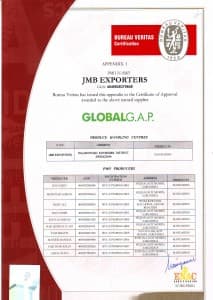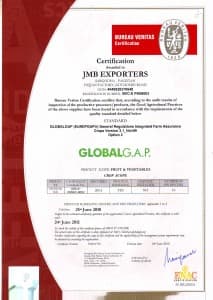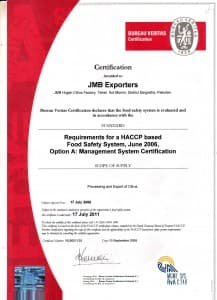JMB Exporters is using the best available practices to grow, process & preserve the food products. To ensure the quality of the products JMB Exporters has the GLOBAL G.A.P, EUROPEGAP, HACCP certifications. We have global gap certified farms.
Global G.A.P.
GLOBAL G.A.P is a private sector body that sets voluntary standards for the certification of production processes of agricultural (including aquaculture) products around the globe.
The GLOBAL G.A.P standard is primarily designed to reassure consumers about how food is produced on the farm by minimizing detrimental environmental impacts of farming operations, reducing the use of chemical inputs and ensuring a responsible approach to worker health and safety as well as animal welfare.
GLOBAL G.A.P serves as a practical manual for Good Agricultural Practice (G.A.P.) anywhere in the world. The basis is an equal partnership of agricultural producers and retailers who wish to establish efficient certification standards and procedures.
The GLOBAL G.A.P website is a comprehensive knowledge base for all interested parties: producers, suppliers, retailers, journalists and consumers. With its clear and easy navigation www.globalgap.org incorporates exhaustive information on the GLOBAL G.A.P standard and its modules and applications.
Global G.A.P. (EUREPGAP)
EUREPGAP started in 1997 as an initiative of retailers belonging to the Euro-Retailer Produce Working Group (EUREP). It has subsequently evolved into an equal partnership of agricultural producers and their retail customers.Our Mission is to develop widely accepted standards and procedures for the global certification of Good Agricultural Practices (GAP).
Technically speaking EUREPGAP is a set of normative documents suitable to be accredited to internationally recognized certification criteria such as ISO Guide 65. Representatives from around the globe and all stages of the food chain have been involved in the development of these documents. In addition the views from stakeholders outside the Industry including consumer and environmental organizations and governments have helped shape the protocols.This wide consultation has produced a robust and challenging but nonetheless achievable protocol which farmers around the world can use to demonstrate compliance with Good Agricultural Practices. The standards are openly available and free to obtain from the EUREPGAP website.
It is possible for producer organizations to seek an independent and transparent recognition of equivalence with the EUREPGAP standards and procedures through a benchmarking system thereby facilitating global trade and aiding the harmonization of technical criteria.
EUREPGAP members include retailers, producers/farmers and associate members from the input and service side of agriculture. Governance is by sector specific EUREPGAP Steering Committees which are chaired by an independent Chairperson. Both the standard and the certification system is approved by the Technical and Standards Committees working in each product sector.These committees have 50% retailer and 50% producer representation creating an effective and efficient partnership in the supply chain.The work of the Committees is supported by Food PLUS a not for profit limited company based in Cologne , Germany.
EUREPGAP was driven by the desire to reassure consumers.Following food safety scares such as BSE (mad cow disease) ,pesticide concerns and the rapid introduction of GM foods consumers throughout the world are asking how food is produced; and they need re-assuring that it is both safe and sustainable. Food safety is a global issue and transcends international boundaries. Many EUREPGAP members are global players in the retail industry and obtain food products from around the world. For these reasons a need has arisen for a commonly recognized and applied reference standard of Good Agricultural Practice which has at its centre a consumer focus.
These factors sometimes known as “the triple bottom line – people, planet and profit” recognise the importance major corporations and multinational supply bases place on ensuring agriculture is undertaken in a responsible way that respects food safety, the environment, workers welfare and the welfare of animals. Good Agricultural Practices, which are understood by producers the world over, deliver clearly defined outcomes in these areas
By adhering to good agricultural practices we reduce the risks in agricultural production. EUREPGAP provides the tools to objectively verify best practice in a systematic and consistent way throughout the world. We achieve this through the protocol and compliance criteria. EUREPGAP’s scope is concerned with practices on the farm, once the product leaves the farm they come under the control of other Codes of Conduct and certification schemes relevant to food packing and processing.That way the whole chain is assured right through to the final consumer.
Another key goal is to provide a forum for continuous improvement. The technical and standards committees, consisting of producer and retail members, has a formal agenda to review emerging issues and carry-out risk assessments. This is a rigorous process, following the principles of HACCP, and involves experts in their field leading to revised versions of the protocol.
Hazard Analysis & Critical Control Points (HACCP)
HACCP is a management system in which food safety is addressed through the analysis and control of biological, chemical, and physical hazards from raw material production, procurement and handling, to manufacturing, distribution and consumption of the finished product.


